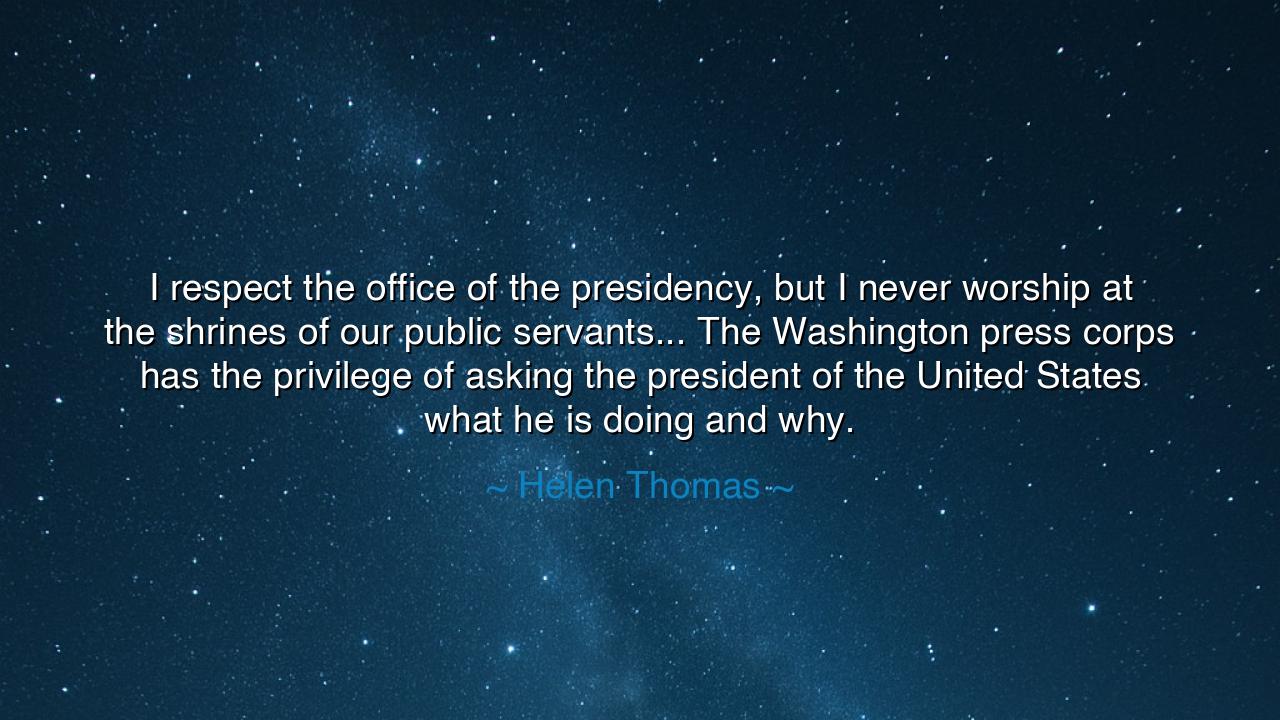
I respect the office of the presidency, but I never worship at
I respect the office of the presidency, but I never worship at the shrines of our public servants... The Washington press corps has the privilege of asking the president of the United States what he is doing and why.






Hear the words of Helen Thomas, the fearless voice of the press, whose questions pierced the halls of power: “I respect the office of the presidency, but I never worship at the shrines of our public servants... The Washington press corps has the privilege of asking the president of the United States what he is doing and why.” These words, though simple, are mighty, for they declare a principle as old as republics themselves: that leaders are not gods to be adored, but servants to be held accountable.
The ancients knew this truth well. Rome, in her early days as a republic, forbade kingship, for they had seen the cruelty of tyrants. Senators and citizens alike believed that no man should be worshiped above the law. When power was unchecked, corruption grew, and nations fell into ruin. Helen Thomas, with the wisdom of a modern sentinel, echoed that same spirit: the presidency is an office to be honored, but never deified. To confuse reverence with worship is to open the door to tyranny.
Consider the story of Watergate. Richard Nixon, shielded by the grandeur of his office, believed he could act above accountability. Yet it was the persistence of journalists—men and women who asked, “What are you doing, and why?”—that unveiled the truth. Their refusal to bow at the shrine of power restored balance to a nation in crisis. In this, Thomas’s words find flesh: the duty of the press is not flattery, but vigilance, not blind praise, but bold inquiry.
Her wisdom also shines as a reminder of the sacred role of questioning. The press corps is not a choir to sing hymns to leaders, but a chorus of watchmen, sounding alarms when power strays. In ancient Athens, free citizens questioned their magistrates, for democracy thrives only when truth is spoken boldly. Without such questioning, rulers become idols, and idols demand worship, not accountability. Thomas knew this danger, and so she carried her questions like arrows of light into the darkness of political secrecy.
The meaning of her words is both heroic and humbling: to respect authority is necessary, for without respect, order collapses. Yet to worship authority is deadly, for worship blinds the eyes and silences the tongue. The greatness of a nation lies not in elevating leaders beyond reproach, but in ensuring that they remain bound by the laws and accountable to the people they serve. True patriotism is not servility—it is courage to demand truth.
The lesson for us is clear: never surrender your voice to power. Whether in politics, in the workplace, or in community, honor those who lead, but do not exalt them beyond question. Ask with courage, “What are you doing, and why?” For this is not insolence, but duty. A free people must never forget that leaders are mortal, fallible, and subject to the same truth they claim to serve.
What then shall we do? Let us live as guardians of accountability. Support the free press, cherish truth-tellers, and be vigilant in your own life against the temptation to bow before power. Teach your children that respect and questioning walk hand in hand. Celebrate leaders when they act with integrity, but never cease to hold them to the standard of justice. In this balance, freedom endures.
Therefore, O listener, carry Helen Thomas’s wisdom in your heart: Honor the office, but never worship the officer. For when citizens bow too deeply, liberty is lost. But when citizens stand upright, questioning boldly and demanding truth, the republic remains alive. This is the sacred duty of the free—to respect, to question, and to keep power bound to the service of the people.






AAdministratorAdministrator
Welcome, honored guests. Please leave a comment, we will respond soon